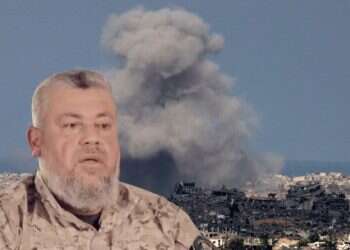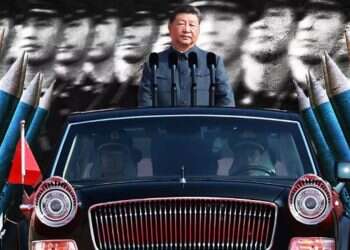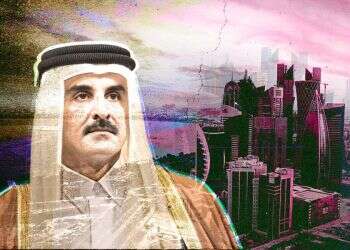Dr. Roni Eichel, the head of neurology at the Shaare Zedek Medical Center in Jerusalem, has two sons serving in elite combat units in the IDF. One of them, in a special forces unit, was seriously wounded fighting in Gaza last month and is now being treated at the hospital where his father works.
Follow Israel Hayom on Facebook, Twitter, and Instagram
Dr. Eichel immigrated to Israel from Germany 26 years ago. He is an ardent Zionist who established an international medical advocacy project in Germany at the outbreak of the war and recruited hundreds of leading doctors in Germany to advocate for Israel. Eichel, who did his military service as a battalion doctor, treated many soldiers who were wounded in the field and performed command duties in the medical corps. When his son went into Gaza, he went through what he describes as a nerve-wracking period.
"Like all families in Israel whose children are fighting in Gaza, I was in an ongoing nightmare and constantly worried," Dr. Eichel says candidly. "The whole time, I kept trying to get information from there about my son." I woke up anxiously every morning at 5:30 a.m. to read the names [of the dead soldiers] that, God forbid, had been permitted for publication. Any unidentified phone number startled me – I thought it might be a casualty officer. The only thing that kept me sane was my work and commitment to providing service and care to my patients.
"I had really bad feelings and I was in a state of constant alert. One day my wife received a phone call from our son, who told her that he had been hurt in the back and that he was hospitalized at Soroka in Beersheba. We immediately drove there. The two-hour ride stuck in traffic jams was the longest I've ever experienced. I went crazy with worry, even though I knew he was in good hands. He suffered a chest wound. It isn't clear if the injury resulted from RPG shrapnel or from a bullet that twisted and tore his ceramic vest, but in any case, the vest prevented penetration into the thorax."
Video: The Hamas attack on Zikim Beach on Oct. 7, 2023 / Credit: Usage under Israeli Intellectual Property Law, Section 27a
"The force with which he was caused rib fractures and extensive bleeding in the lungs. My son arrived at the hospital in serious condition, and it turned out that the skill of the medics in the field, together with his quick evacuation and treatment at Soroka, saved his life. A day later, his condition stabilized, and I was able to transfer him for further treatment to the cardiothoracic department at Shaare Zedek, run by Dr. Daniel Fink. The doctor from my son's unit also came; he treated him in the field and was the one who stabilized his condition there and saved his life. It was a very moving meeting."
Dr. Eichel, a veteran and respected physician, is also an intensive care specialist who has treated many trauma patients. This time though he found himself facing a shocking personal-family situation: "We came out of it thanks to a great miracle. Our son was in an induced coma and on a ventilator when he arrived in the ICU. He will have to undergo rehabilitation, but he is on his feet. A few centimeters further in, God forbid, and he would have been quadriplegic. My son was saved from death thanks to only a few centimeters.
"When he woke up, he asked if anyone from his squad had been hurt and when he could return to combat. Half of his back was opened up. He needs to have another operation on the wound on his back.
"After he was wounded, I had very complex and contradictory feelings. On the one hand, as soon as I heard about the injury, I understood its magnitude and the risks involved. While I quickly realized that it was not a total catastrophe, it was stressful nonetheless. It wasn't until I saw him standing on his feet that I allowed myself to take a deep breath and relax, because there was still a risk of infection. That's what it means to be a father who is also a doctor. My professional knowledge didn't help me; it only made me uneasy, because in an injury like this, there are things that you can't always control. Now I'm more relaxed."
Dr. Eichel's son, who serves in a special forces unit and fought Hamas terrorists during the October 7 attack and then went into combat in Gaza, has in the meantime recovered from his serious injury, but the sensitive father, who is an experienced doctor, is still amazed by the amount of warmth and love his son and the rest of the family received: "The embrace we experienced from the people of Israel is incomprehensible. So many people contacted us, supported us, and wanted to help, and on top of that NGOs that provide solutions for every situation.
"There was a constant flow of visitors and gifts. It was the people of Israel at their very best. It was touching and very moving. I am also pleasantly surprised by the institutional aspect and by the work of the IDF's casualty unit, which was above and beyond anything I expected."
Alongside caring for his son, Dr. Eichel is currently running an important project working with the medical community in Germany, the country from which he made aliyah to Israel: "The number of wars I have been through since making aliyah is incomprehensible. Wars are getting harder and harder. I was not surprised by the cruelty of Hamas, but only by our failure. The fact that they managed to do what they did is a big surprise. This needs to be investigated in depth. This was a classic case of arrogance."
Dr. Eichel is critical of the way the world has treated Israel in the wake of the October 7 massacre. "The level of civil courage shown abroad in condemning the atrocities was not high. We sent letters to professional medical organizations calling on them to condemn Hamas and support the State of Israel. My desire, even need, was that in Germany, the country where I grew up, there would be a clear condemnation of Hamas' actions. I founded an organization whose goal is to mobilize the German medical community on Israel's behalf: to condemn Hamas' crimes, to demand the return of the hostages, and to condemn the rising tide of antisemitism across the world.
"One of the ways we work is with Zoom lectures. We invite various organizations to a professional medical lecture, through which we generate interest among German doctors about October 7 – and at the same time also open their hearts to Israel. This is the most effective way to establish influence in the medical community because most Germans have values similar to ours. In this way, we seek to bring about a change in world public opinion in favor of Israel."




